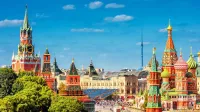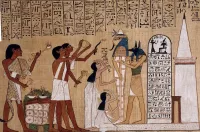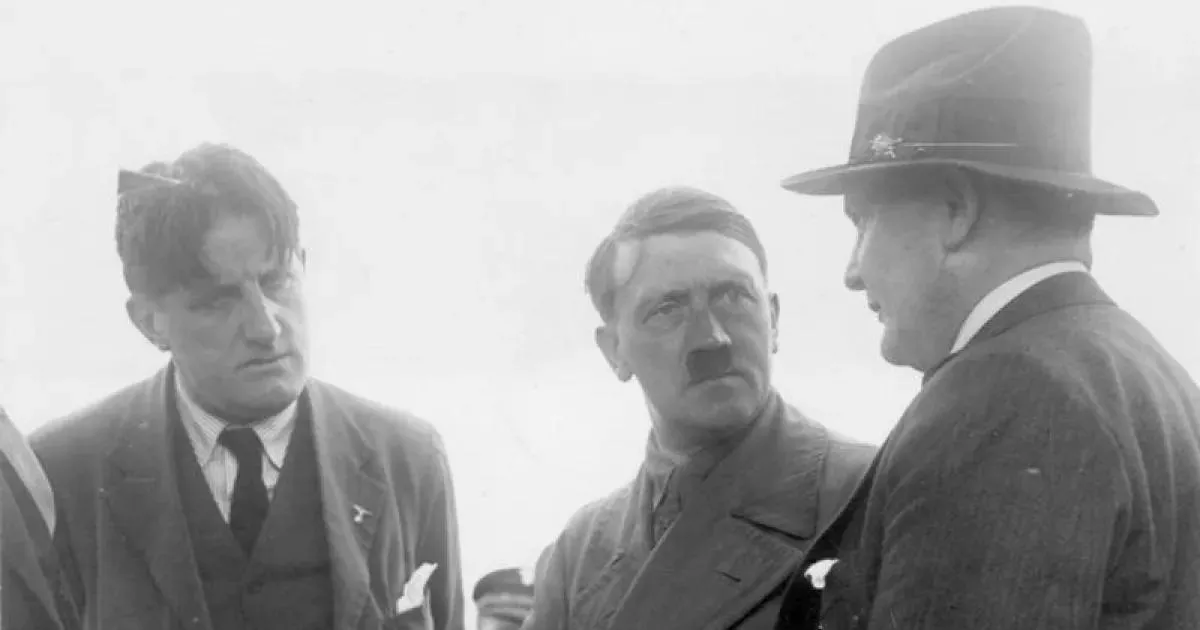Adolf Hitler's ascent to power began in 1919 when he joined the German Workers' Party, which he transformed into the Nazi Party and became its leader in 1921. Exploiting the Weimar Republic's instability, Hitler gained popularity through propaganda and promises of national restoration. While initially espousing some anti-capitalist ideas, he later purged those elements to gain support from industrialists. Key to consolidating his authority were ruthless tactics, including the Night of the Long Knives, which eliminated internal opposition and solidified his control over the Nazi Party.
August 1914: Hitler Enlists in Bavarian Regiment
In August 1914, Adolf Hitler, an Austrian-born 25-year-old, enlisted in a Bavarian regiment of the German Army after receiving permission from King Ludwig III of Bavaria, despite not yet being a German citizen.
January 1919: Hitler Serves as Guard at POW Camp
In January 1919, Adolf Hitler was reassigned to a prisoner-of-war camp in Traunstein as a guard, remaining there until the camp dissolved.
January 1919: Formation of the German Workers' Party
On January 5, 1919, the German Workers' Party (DAP) was formed by Anton Drexler, Karl Harrer, and others through the amalgamation of other groups.
February 1919: Assassination of Kurt Eisner
On February 21, 1919, socialist Kurt Eisner was assassinated by a German nationalist. His rival Erhard Auer was also wounded in an attack.
April 1919: Hitler Elected as Liaison
In April 1919, Hitler was elected as the liaison of his military battalion on April 3 and again on April 15, urging his unit to stay out of the fighting.
May 1919: Karl Mayr Becomes Commander
In May 1919, Karl Mayr became commander of the 6th Battalion and head of the "Education and Propaganda Department".
May 1919: Bavarian Soviet Republic Crushed
On May 6, 1919, the Bavarian Soviet Republic was officially crushed, and in the aftermath, Hitler denounced a fellow liaison as a Soviet "radical rabble-rouser."
June 1919: Hitler Moved to Demobilization Office
In June 1919, Hitler was moved to the demobilization office of the 2nd Infantry Regiment.
July 1919: Hitler Appointed Intelligence Agent
In July 1919, Hitler was appointed Verbindungsmann (intelligence agent) of an Aufklärungskommando (reconnaissance commando) of the Reichswehr to influence soldiers and infiltrate the German Workers' Party (DAP).
September 1919: Hitler Disputes Secession Advocate
During the 12 September 1919 meeting, Hitler vehemently opposed an audience member advocating for Bavaria's secession from Germany and uniting with Austria.
September 1919: Hitler Joins German Workers' Party
In September 1919, Adolf Hitler joined the Deutsche Arbeiterpartei (DAP; German Workers' Party) in the newly established Weimar Republic. This marked the beginning of his rise to power in Germany.
February 1920: Hitler Announces 25-Point Program
On 24 February 1920, Hitler announced the Nazi Party's 25-point program and engineered the name change of the DAP to the Nationalsozialistische Deutsche Arbeiterpartei (NSDAP) at a meeting in the Staatliches Hofbräuhaus in München.
March 1920: Hitler Discharged from Army
In March 1920, Hitler was discharged from the army and began working full-time for the Nazi Party, receiving financial support from wealthy patrons and party sympathizers.
1920: Organization of Hall Protection Squad
In 1920, a small "hall protection" squad was organized around Emil Maurice, initially named the "Order troops". Hitler also began lecturing in Munich beer halls and the police were monitoring the speeches.
June 1921: Mutiny within the Nazi Party
In June 1921, while Hitler was on a fundraising trip to Berlin, a mutiny broke out within the Nazi Party in Munich, with members wanting to merge with the German Socialist Party (DSP).
August 1921: Formation of the Gymnastic and Sports Division
In August 1921, Hitler redefined the "hall protection" squad as the "Gymnastic and Sports Division" of the party, which was later known as the Sturmabteilung (SA).
September 1921: Disruption of Bavarian League meeting
In September 1921, Hitler and SA members disrupted a Bavarian League meeting at the Löwenbräukeller, an organization that opposed the Weimar Constitution's centralism. Hermann Esser blamed Jews for Bavaria's issues, and Nazis demanded Otto Ballerstedt yield to Hitler, leading to Ballerstedt's beating and removal. Hitler and Esser were arrested, with Hitler stating they achieved their goal of silencing Ballerstedt.
November 1921: Officially Named Sturmabteilung (SA)
By November 1921, the Gymnastic and Sports Division of the party was officially known as the Sturmabteilung (SA).
November 1921: Nazi Party public meeting in Munich Hofbräuhaus
In November 1921, the Nazi Party held a large public meeting in the Munich Hofbräuhaus. After Hitler's speech, a melée erupted, with the SA defeating the opposition.
1921: Hitler Becomes Party Leader
In 1921, Adolf Hitler became the leader of the Nazi Party after threatening to leave, consolidating his control over the organization.
January 1922: Hitler sentenced to imprisonment
In January 1922, Hitler was sentenced to three months' imprisonment for "breach of the peace" related to his actions at the Hofbräuhaus. He served a little over one month at Stadelheim Prison in Munich.
1922: Hitler's Control Unchallenged
By 1922, Hitler's control over the Nazi Party was unchallenged, solidifying his position as the dominant figure within the organization.
1922: Formation of the Hitler Youth and Stabswache
In 1922, Hitler and the Nazi Party formed the Jungsturm Adolf Hitler and the Jugendbund der NSDAP, which later became the Hitler Youth. Also, the Stabswache (Staff Guard) was created, which was renamed the Stoßtrupp-Hitler (Shock Troop-Hitler) in May 1923 and would become the Schutzstaffel (SS).
May 1923: Renaming of Stabswache and failed coup attempt
In May 1923, the Stabswache was renamed to Stoßtrupp-Hitler. Inspired by Benito Mussolini's March on Rome, Hitler planned a coup d'état. Small Reichswehr elements aided the SA in illegally obtaining weaponry, but the order to march was canceled after Army General Otto von Lossow warned Hitler of Reichswehr opposition.
November 1923: Beer Hall Putsch and Hitler's Arrest
On November 8-9, 1923, Hitler led the Beer Hall Putsch in Munich, attempting to depose Bavarian government officials and establish a base for marching on Berlin. Around 2,000 Nazi Party members marched to Marienplatz but were stopped by police. Sixteen Nazis and four officers died. Hitler was arrested on November 11, 1923 and charged with high treason.
1923: Beer Hall Putsch and Imprisonment
In 1923, Hitler attempted a coup d'état known as the Beer Hall Putsch in Munich but was imprisoned. He used this time to write Mein Kampf.
February 1924: Trial for high treason begins
In February 1924, Hitler's trial for high treason began. He attempted to put democracy and the Weimar Republic on trial, portraying them as traitors.
May 1924: Nazi Party's participation in the federal election as NSFB
In May 1924, the Nazi Party, banned in Bavaria after the Beer Hall Putsch, participated in the German federal election as the National Socialist Freedom Movement (NSFB), gaining seats in the Reichstag with 6.6% of the vote.
October 1924: Public declaration of citizenship
In October 1924, as his citizenship became a topic of public debate, Hitler had a public declaration printed.
December 1924: Loss of seats in the December federal election
In the December 1924 federal election, the National Socialist Freedom Movement lost 18 seats, retaining only 14, with 3% of the electorate voting for Hitler's party.
December 1924: Release from Landsberg Prison
On December 20, 1924, Hitler was released from Landsberg Prison after serving nine months of a five-year sentence, following a pardon by the Bavarian Supreme Court. During his imprisonment, Hitler began writing the first volume of Mein Kampf.
April 1925: Renunciation of Austrian citizenship
On April 7, 1925, under the threat of deportation to Austria, Hitler formally renounced his Austrian citizenship. He would not acquire German citizenship until almost seven years later, preventing him from running for public office.
May 1928: Poor results for the Nazi Party in federal election
In May 1928, the Nazi Party secured only 12 seats in the Reichstag. Due to these poor results, Hitler decided Germans needed to know more about his goals, and wrote a second book.
March 1929: Ludendorff represents Nazi Party in Presidential elections
In March 1929, Erich Ludendorff represented the Nazi Party in the Presidential elections, earning 280,000 votes (1.1%).
1929: Wall Street Crash and Economic Crisis
The Wall Street crash of 1929 dramatically affected the German political landscape, triggering the Great Depression, halting the German economy, and further polarizing German politics.
January 1930: Horst Wessel fatally shot, becomes Nazi propaganda opportunity
In January 1930, Horst Wessel was fatally shot by KPD members in Friedrichshain following an argument. Goebbels used Wessel's death and the Horst-Wessel-Lied as anti-Communist propaganda.
September 1930: Nazi Party gains significant victory in federal election
In the September 1930 German federal election, Hitler's party achieved a significant victory, gaining 107 seats (18.3%) in the Reichstag, thereby becoming the second-largest party in Germany.
October 1930: SA's anti-Jewish action at Potsdamer Platz
On October 13, 1930, the SA began its first major anti-Jewish action, with Nazi brownshirts smashing windows of Jewish-owned stores at Potsdamer Platz.
1930: Nazi and Communist gains in federal election
In 1930, tired of the old economic systems due to the Wall Street crash of 1929, the people of Germany voted for the Nazis and the Communists, who secured almost 40% of Reichstag seats.
March 1931: Prussia re-enacts ban on Brownshirts and Goebbels speaking ban
In March 1931, Prussia re-enacted its ban on Brownshirts. Days after the ban, SA-men shot dead two communists, leading to a ban on Goebbels' public speaking.
1931: Rising SA Deaths
By the end of 1931, the SA had suffered 47 deaths and the Rotfront recorded losses of approximately 80 killed.
1931: Nazi Party alters strategy for perpetual campaigning
In 1931, the Nazi Party changed its strategy to engage in perpetual campaigning across Germany, even outside of election time, combining terror tactics with conventional campaigning.
April 1932: Banning of Nazi Party Paramilitaries
On April 13, 1932, following the presidential elections, the German government banned the Nazi Party paramilitaries, the SA and the SS, on the basis of the Emergency Decree for the Preservation of State Authority. This ban was later lifted on June 16 by Franz von Papen.
April 1932: Presidential Election Loss and Street Fights
Throughout February and April 1932, street fights and beer hall battles resulted in deaths amidst Adolf Hitler's presidential election competition against Hindenburg. On April 10, 1932, Hitler lost the election to Paul von Hindenburg.
June 1932: Franz von Papen appointed Chancellor
In June 1932, President von Hindenburg, with Schleicher's backing and Hitler's approval, appointed the Catholic monarchist Franz von Papen to replace Brüning as Chancellor. Papen hoped to outmaneuver Hitler.
July 1932: Nazis Become Largest Party in Reichstag
In July 1932, the Nazi Party became the largest party in the Reichstag, although they did not secure an absolute majority.
July 1932: Nazi Party Gains in Federal Election
In the federal election of July 1932, the Nazis won 37.3% of the popular vote, becoming the largest party in the Reichstag. Following this, the KPD increasingly turned towards violence, leading to battles and the assassination of SA leader Axel Schaffeld on August 1.
November 1932: Hitler's Appointment as Chancellor
After the parliamentary elections of July and November 1932 failed to produce a majority government, and following secret communications with Papen and the Industrielleneingabe letter, Hindenburg reluctantly agreed to appoint Hitler as chancellor. This marked the beginning of a short-lived coalition government.
November 1932: Nazi Party Losses in Election
In the November 1932 election, the Nazi Party lost 35 seats but remained the Reichstag's largest party, with 196 seats. The Social Democrats (SPD) and Communists (KPD) also won seats.
1932: Political parties failed to block Nazis
In 1932, the political parties in the Weimar Republic failed to stop the rise of the Nazis. The Catholic Centre Party negotiated with the Nazis, and the Communists prioritized destroying the Social Democrats.
January 1933: Hitler's Cabinet Sworn In
On January 30, 1933, Hitler's new cabinet was sworn in, with Hitler as Chancellor, Wilhelm Frick as Minister of the Interior, and Hermann Göring as Minister Without Portfolio. This event, known as Hitler's Machtergreifung, marked the Nazis' "seizure of power".
January 1933: Hitler Appointed Chancellor
On January 30, 1933, following negotiations, President von Hindenburg formally appointed Hitler as Germany's new chancellor.
February 1933: Reichstag Fire and Decree
In February 1933, the Reichstag was set on fire, and Hitler used this as a pretext to pass the Reichstag Fire Decree, curtailing civil liberties and rights.
February 1933: Shifting Opinions on Hitler
On February 22, 1933, Sir Horace Rumbold, the British Ambassador in Berlin, recognized Hitler as a clever demagogue. Robert Vansittart, from the Foreign Office, then concluded that Hitler's gaining power would lead to another European war.
March 1933: Passage of the Enabling Act
Following the Reichstag fire, in March 1933, the Nazis suspended civil liberties and eliminated political opposition. On March 23, 1933, Hitler secured the passage of the Enabling Act, granting him plenary powers to act without parliamentary consent or constitutional limitations.
July 1933: Outlawing of Non-Nazi Parties
In July 1933, after the passage of the Enabling Act, Hitler abolished the powers of the states and the existence of non-Nazi political parties. Non-Nazi parties were formally outlawed on July 14, 1933, and the Reichstag abdicated its democratic responsibilities.
1933: Continuation of Nazi campaigning tactics
From 1931 to 1933, the Nazis combined terror tactics with conventional campaigning: Hitler traveled across Germany by air, while SA troops paraded, beat up opponents, and disrupted their meetings.
1933: Hitler Becomes Dictator of Nazi Germany
In 1933, Adolf Hitler became the dictator of Nazi Germany, marking a significant turning point in German history and the beginning of a totalitarian regime.
1933: Conviction and Release of SA Men
In 1933, five SA men were convicted and sentenced to death for the murder of a KPD member in Potempa. The sentences were commuted to life imprisonment, but they were freed after just over four months following a 1933 amnesty by Hitler.
August 1934: Consolidation of Power after Hindenburg's Death
After the death of Hindenburg in August 1934, Hitler combined the positions of President and Chancellor into one office, solidifying his dictatorial power. Soldiers swore unconditional obedience to Hitler personally, and a referendum approved of combining the two roles.
August 1934: Hitler Becomes Führer
In August 1934, after Hindenburg's death, Hitler merged the chancellery with the presidency, assuming the title of Führer ("leader"), completing his rise to power.
1934: Papen's Role and Subsequent Departure
In 1934, Papen served as Vice-Chancellor, initially speaking out against Nazi excesses. However, after narrowly escaping death in the Night of the Long Knives, he ceased criticism and was sent to Vienna as German ambassador.
Mentioned in this timeline
Germany officially the Federal Republic of Germany is a nation...

Books are a means of storing information as text or...

War is defined as an armed conflict involving the armed...

Fire is a rapid oxidation process called combustion releasing heat...

Moscow is the capital and largest city of Russia located...

A funeral is a ceremony for the final disposition of...
Trending

3 minutes ago Blair Underwood Discusses Fame, Staying True, and Almost Passing on 'Set It Off'

3 minutes ago Zach Braff reflects on Scrubs' return and auditioning six times 25 years ago.

3 minutes ago Embiid Probable, Powell's Status Uncertain for Sixers-Heat Game: Injury Report Details
3 minutes ago Ghosts Season 5 Premieres: New Spirits and More Laughs on Paramount+

4 minutes ago Desmond Bane, Anthony Edwards Fined $25K by NBA for Throwing Balls

1 hour ago Kim Mulkey's LSU Tigers: NCAA Tournament Seeding Possibilities and AP Poll Ranking
Popular

Jesse Jackson is an American civil rights activist politician and...

Susan Rice is an American diplomat and public official prominent...

Barack Obama the th U S President - was the...

XXXTentacion born Jahseh Dwayne Ricardo Onfroy was a controversial yet...

Michael Joseph Jackson the King of Pop was a highly...

Kashyap Pramod Patel is an American lawyer who became the...

